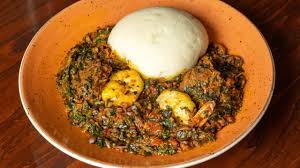9:33 AM From Kitchen to Culture: The Essence of Nigerian Food | |

Nigerian cuisine stands as a vibrant expression of the country’s cultural and ethnic diversity. Its meals are more than just food—they’re history, identity, and celebration served on a plate. Whether you're a foodie, chef, or cultural explorer, diving into the world of Nigerian food recipes is your first step into a culinary adventure like no other. The Time-Honored Beauty of Traditional Nigerian DishesIn every region, you’ll find proud heritage encoded in traditional Nigerian dishes. Meals like banga soup, tuwo shinkafa, and nkwobi are not just delicious—they are dishes tied to stories, ancestors, and traditions passed down for centuries. Understanding the Full Scope of Nigerian CuisineThere is no single definition of Nigerian cuisine. It is a mosaic of flavors—spicy, earthy, sour, and sweet—all wrapped into meals shaped by Nigeria’s geography and ethnic groups. From the riverine delicacies of the south to the spicy stews of the north, the cuisine is vast and thrilling. The Irresistible Taste of Popular Nigerian MealsFew countries boast the rich flavor variety found in popular Nigerian meals. Dishes like amala and ewedu, yam pottage, and spicy grilled suya are household favorites with regional identities, and they often dominate Nigerian gatherings, parties, and homes. Cooking with Soul: Authentic Nigerian RecipesTo truly appreciate Nigerian cuisine, try out authentic Nigerian recipes made with indigenous ingredients and methods. These recipes ensure you taste the real thing—not watered-down versions, but the bold, deep flavors that define Nigerian food. Deep, Delicious, and Diverse: Nigerian Soups and StewsYou can’t talk about Nigerian food without mentioning its signature Nigerian soups and stews. These include richly textured dishes like afang, oha, and egusi soup—all traditionally served with swallows like fufu or pounded yam. Satisfying Every Craving with Nigerian Rice DishesWhether for festive occasions or regular dinners, Nigerian rice dishes such as jollof, fried rice, and rice and stew are staples. Often cooked in palm oil or stock, these dishes can transform even ordinary ingredients into extraordinary meals. Snack Time: The Joy of Nigerian Snacks and AppetizersHungry for a bite between meals? Check out Nigerian snacks and appetizers like meat pies, puff-puff, chin chin, and plantain chips. These street favorites are ideal for school lunches, office breaks, or party trays. Street Eats: The Flavor of Nigerian Street FoodThe heartbeat of the city is often found in its food stalls. Nigerian street food like roasted yam, grilled fish, and suya satisfy the taste buds of millions and reflect the pulse of urban Nigerian life. Sweet but Understated: Nigerian DessertsThough not as globally known, Nigerian desserts such as coconut candy, sugar-coated peanuts, and sweet masa bring warmth and delight to the end of a meal. Fueling the Morning with Nigerian Breakfast RecipesStart your day like a Nigerian with fulfilling Nigerian breakfast recipes. Try yam with egg sauce, bread and akara, or pap with moi moi. These are rich, satisfying meals that offer lasting energy. Tasty and Comforting: Nigerian Dinner IdeasWhen the sun sets, it’s time for comfort food. Explore Nigerian dinner ideas that include pepper soup, vegetable sauces, and spicy stews—perfect for closing the day on a satisfying note. A Way of Life: Nigerian Food CultureFood plays a central role in Nigerian identity. Nigerian food culture includes shared family meals, food rituals during festivals, and respectful practices that turn every dish into an experience of belonging. For Busy Days: Easy Nigerian RecipesEven with a packed schedule, you can enjoy the country’s rich flavors with easy Nigerian recipes. One-pot jollof, quick okra soup, or spicy noodles with vegetables are delicious and quick to make. Meat-Free and Flavor-Packed: Nigerian Vegetarian DishesLooking for plant-based options? Nigerian vegetarian dishes such as beans and plantain, vegetable sauce, or yam porridge offer all the flavor without the meat. ConclusionNigerian cuisine is more than a collection of dishes—it’s a living, breathing part of the culture. With the help of curated Nigerian food recipes, you can bring this rich tradition into your own kitchen and savor a taste of Nigeria, one delicious bite at a time. | |
|
| |
| Total comments: 0 | |